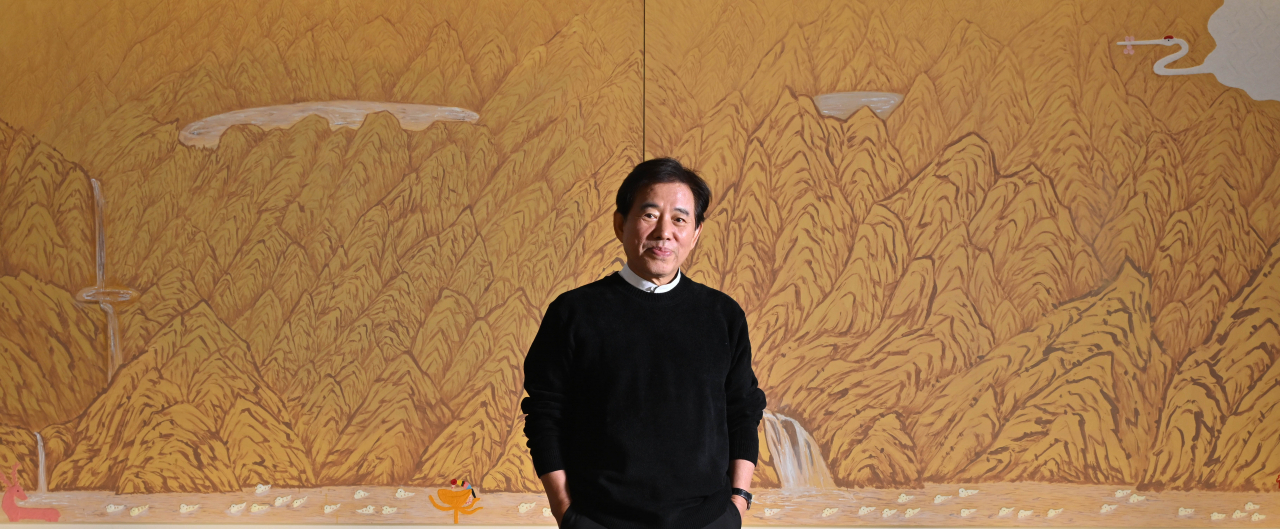 |
Kim Byung-jong poses for a photo at the exhibition “The Rhapsody of Life: A Half-Century Art Archive of Kim Byung-jong” on Friday at Culture Station Seoul 284 in Seoul. (Im Se-jun/The Korea Herald) |
Looking back on the past five decades, painter Kim Byung-jong said he was “raised by nature” when he was a child, which has shaped his artistic inspiration until the present day. The energy, colors – particularly the theme of life – seen in his works come from nature.
Born in Namwon, a small city located just outside South Korea’s largest set of mountains, Jirisan National Park, Kim recalled the sound of the leaves of bamboo trees behind his house brushing against each other, making crisp sounds. The painting, “Song of Life – Bamboo in the Wind,” from 2019 is how he visualized the sound of the bamboo trees on a windy night.
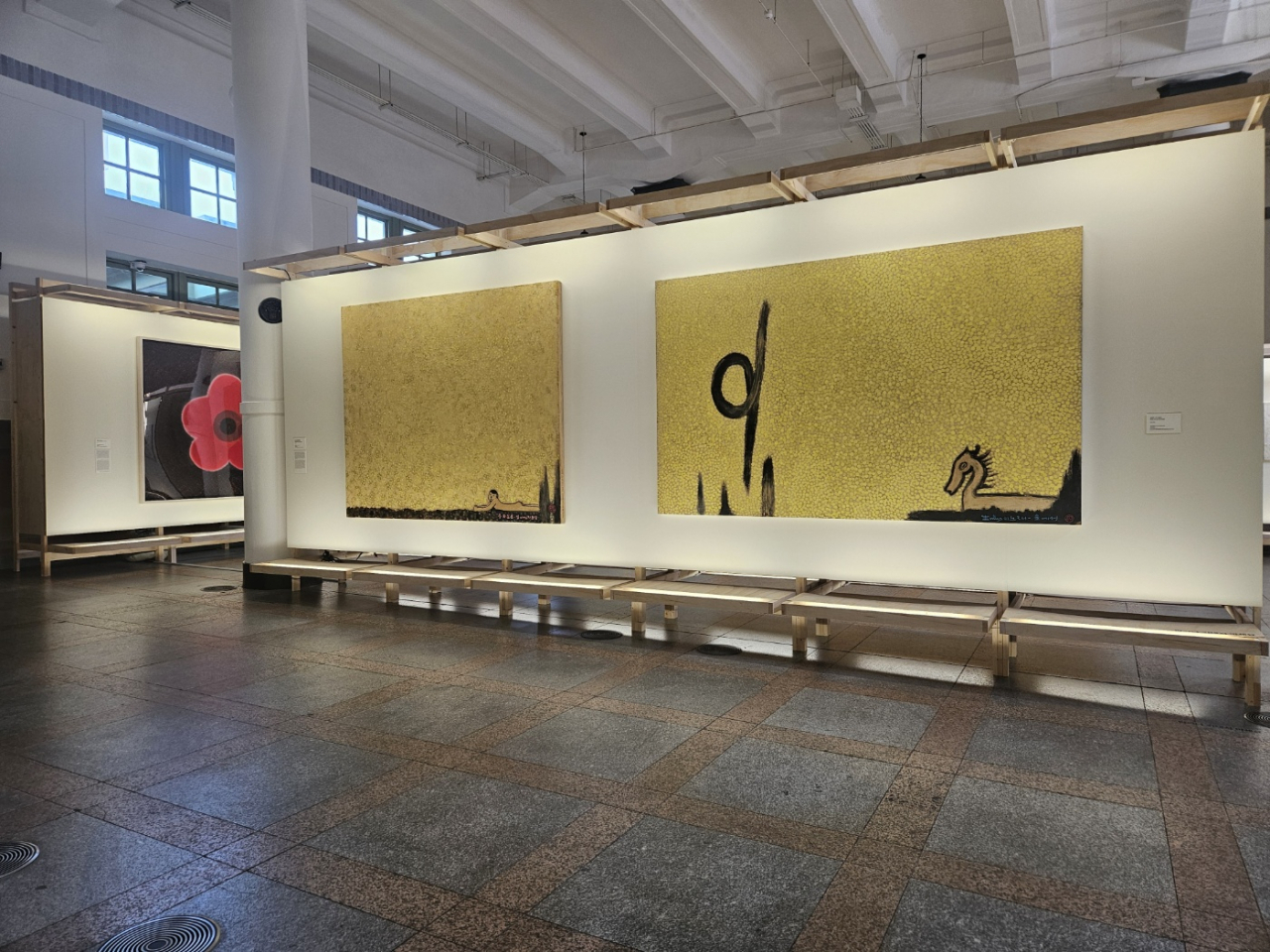 |
An installation view of the exhibition “The Rhapsody of Life: A Half-Century Art Archive of Kim Byung-jong” at Culture Station Seoul 284 in Seoul (Park Yuna/ The Korea Herald) |
“I used to see this yellowish cloud when I was a child and later found out that was pine pollen drifting through the wind. Pine pollen particles are smaller than mustard seeds and possess an innate intelligence. They were traveling for life,” Kim said during an interview with The Korea Herald on Friday.
A large-scale exhibition “The Rhapsody of Life: A Half-Century Art Archive of Kim Byung-jong” is currently running at Culture Station Seoul 284, a century-old train station that has been turned into a cultural center.
“I enjoyed seeing how these works are displayed in this historical space,” the artist said. The artist painted “Jesus, the Fool” series, using ink on hanji, traditional Korean mulberry paper, in his early career in the 1980s, raising criticism among people as it was deemed taboo to have Jesus Christ as the subject of a painting here.
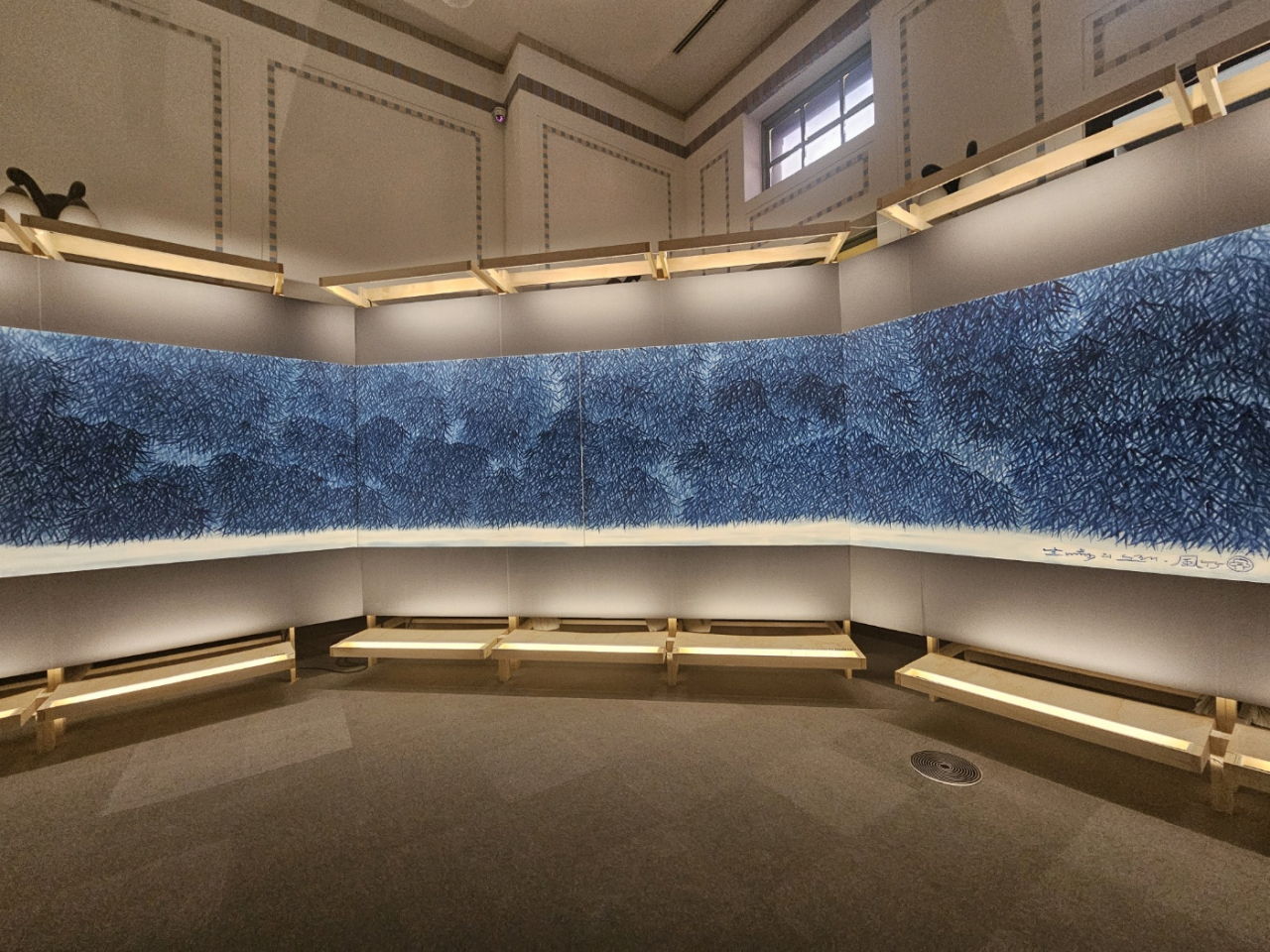 |
An installation view of "Song of Life – Bamboo in the Wind" by Kim Byung-jong at Culture Station Seoul 284 (Park Yuna/The Korea Herald) |
Seemingly a soft character, the artist had a “rebellious” passion inside him when he began painting as a teenager. “My father passed away when I was an elementary school student. When I started to grab a brush wishing to be a painter, people pointed a finger at me. They did not think being a painter counted as a job because it was very difficult to make money," he said.
“I would skip school as I thought it was boring, learning the same things repeatedly,” he added.
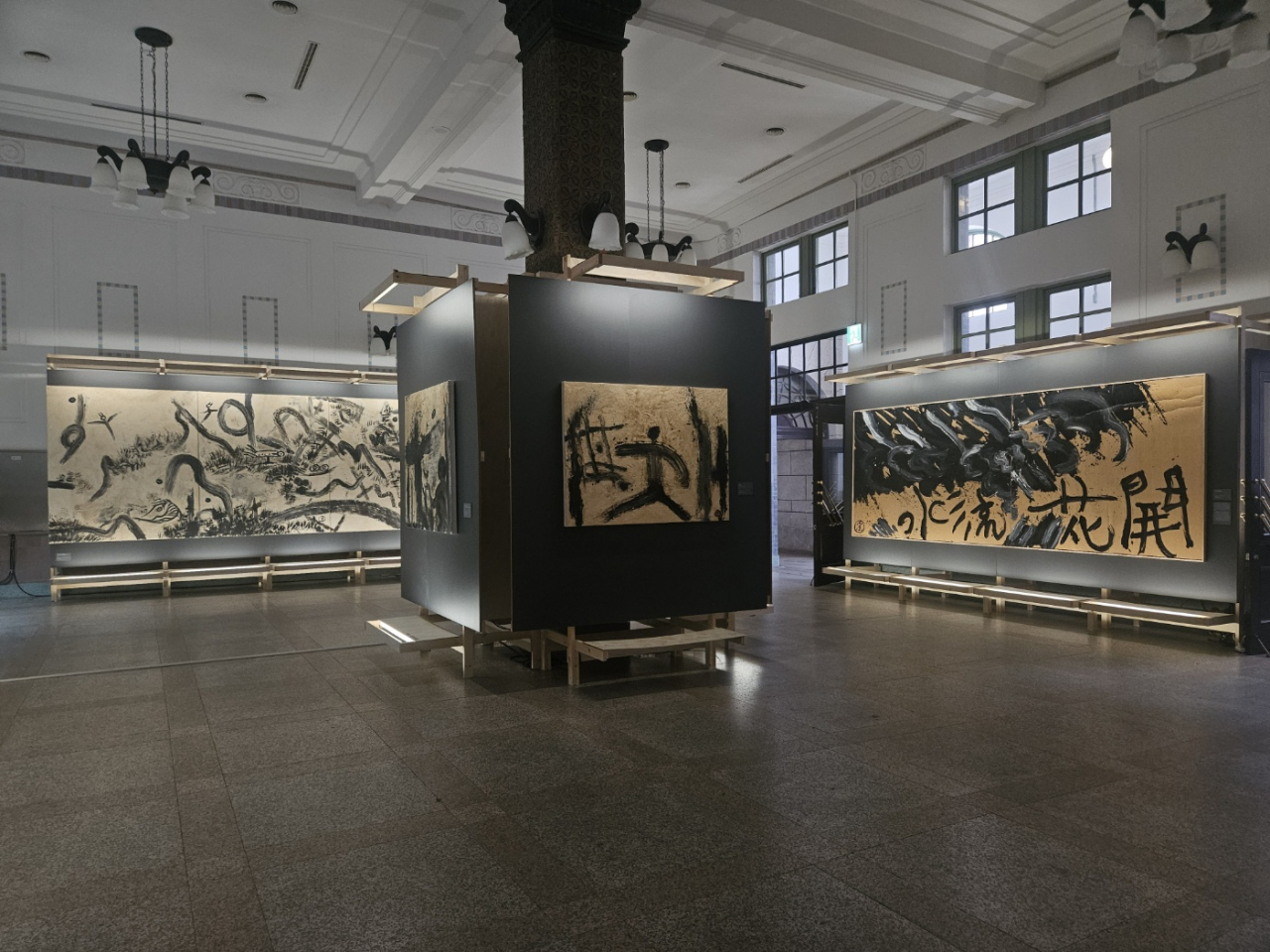 |
An installation view of the exhibition “The Rhapsody of Life: A Half-Century Art Archive of Kim Byung-jong” at Culture Station Seoul 284 in Seoul (Park Yuna/ The Korea Herald) |
It was in the 1990s, after he nearly died in a carbon monoxide poisoning accident in 1989, that he started earnestly painting a series that seeks for the meaning of life.
He moved from “Jesus, the Fool” series to “Song of Life,” praising life with gratitude. Making his own canvas using traditional Korean mulberry paper, or hanji, he began painting his childhood recollections.
As if he to prove his faith in and will to be a painter, he persevered, developing a painting series that evolves around the theme of life.
“There was a time when I deeply thought about the identity of Korean painting,” Kim said. “And I found this sentiment in our ordinary lives, how we lived with nature back in the day. It's very humane.”
Kim’s signature “Red Flower Landscape” features a unique texture created when red ink permeates hanji, the edges of the flower petals blurred, reminiscent of a heart.
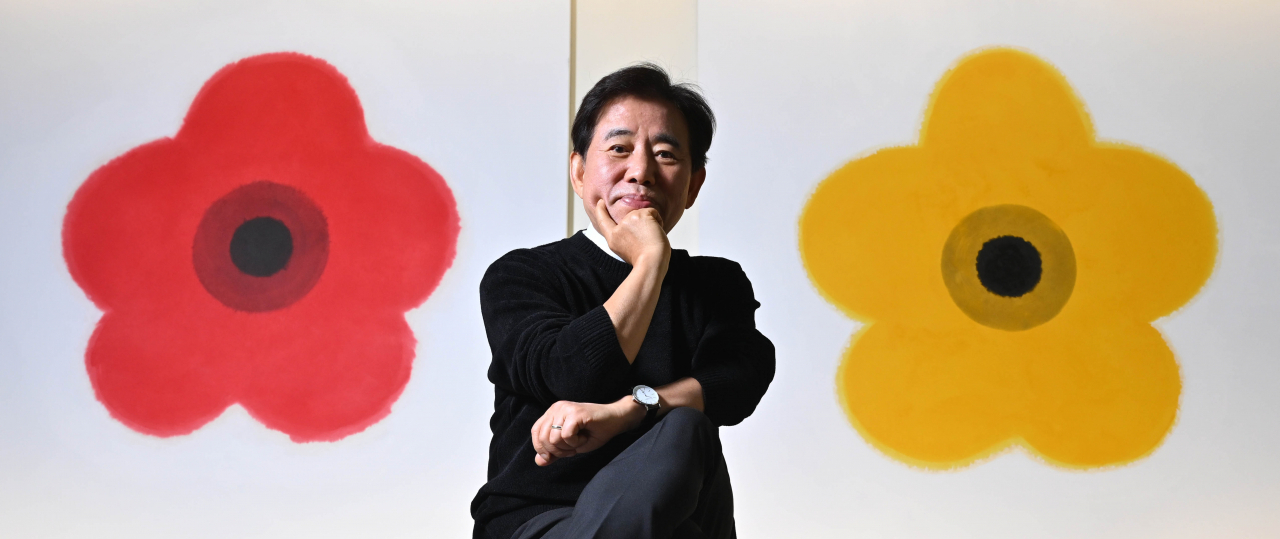 |
Kim Byung-jong poses for a photo at the exhibition “The Rhapsody of Life: A Half-Century Art Archive of Kim Byung-jong” on Friday at Culture Station Seoul 284 in Seoul. (Im Se-jun/The Korea Herald) |
The exhibition includes his writings and drawings from “Picture Book of an Art Journey,” a volume that features his poems and travel writings with illustrations.
“I feel like painting and writing go hand in hand for me,” Kim said. “After constantly painting, I feel like I become hollow for some reason, so I have to write and read. And after writing and reading, I become motivated to paint to express my own things in a visual way.”
Kim will have an exhibition at the Queens Museum in New York sometime next year.
The exhibition at Culture Station Seoul 284, organized by the Korea Craft and Design Foundation, will run through Oct.24.
Kim was formerly a professor at Seoul National University’s College of Fine Arts where he taught until he retired in 2018 and is now a professor emeritus. The Kim Byung Jong Art Museum opened in 2018 in Namwon, his hometown.
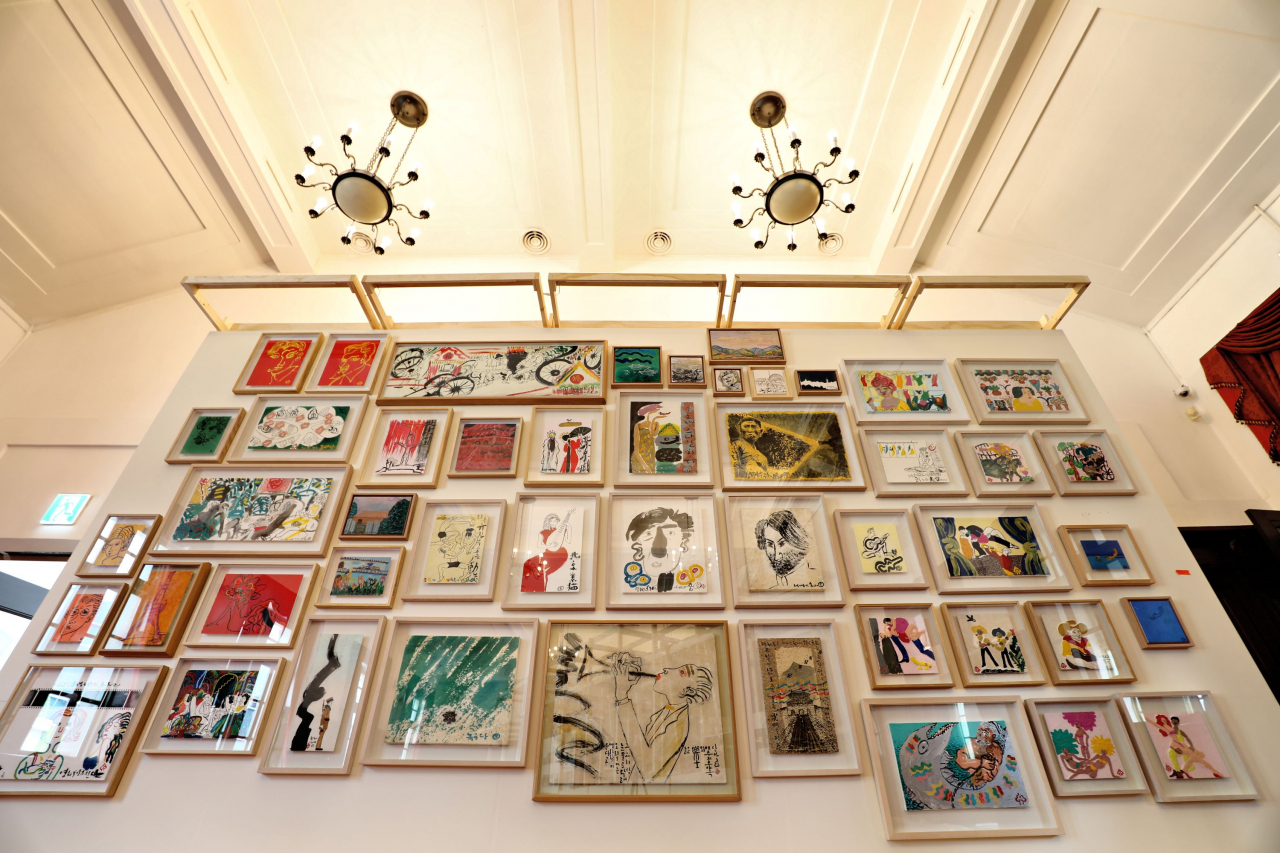 |
An installation view of Kim Byung-jong's illustrations at the exhibition “The Rhapsody of Life: A Half-Century Art Archive of Kim Byung-jong” at Culture Station Seoul 284 in Seoul (Provided by Korea Craft and Design Foundation) |







![[Today’s K-pop] Blackpink’s Jennie, Lisa invited to Coachella as solo acts](http://res.heraldm.com/phpwas/restmb_idxmake.php?idx=644&simg=/content/image/2024/11/21/20241121050099_0.jpg)